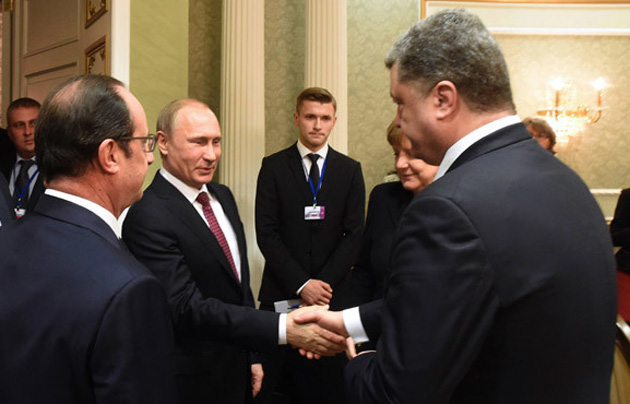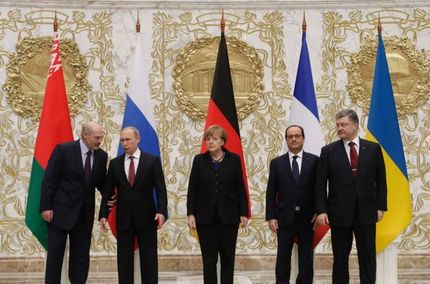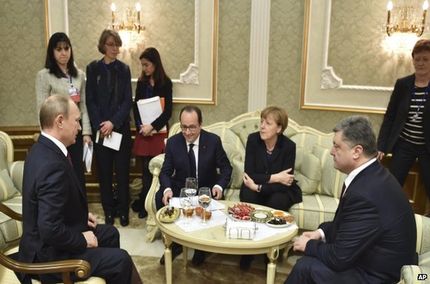The Ukraine-Russia agreement includes the removal of heavy weapons and the release of all prisoners.
 Vladimir Putin shook hands with Petro Poroshenko at the start of the meeting. / AP
Vladimir Putin shook hands with Petro Poroshenko at the start of the meeting. / AP
After 17 hours of negotiations, the leaders of Russia, Ukraine, Germany and France announced that a ceasefire deal had been approved.
“I believe we agreed on a big deal. We agreed to a ceasefire starting at 00:00 on February 15,” Putin announced. He made the announcement following marathon talks involving Ukrainian President Petro Poroshenko, as well the leaders of France and Germany.
A compromise decision was taken over the disengagement line, which was the biggest stumbling block in the negotiation. Putin said Kiev’s troops would pull back heavy weapons from the current frontline. The rebels would pull back from the line as it existed in September, when the previous ceasefire agreement was signed.
 Leaders pose during talks at the presidential residence in Minsk. / AFP
Leaders pose during talks at the presidential residence in Minsk. / AFPSECURITY ZONE AND WEAPONS
The security zone separating the warring parties must be at least 50km wide for artillery over 100mm caliber, 70km for regular multiple rocket launchers and 100km for heavier weapons with a longer range, like Tochka-U ballistic missiles, the document states.
The weapons pullout must start on Sunday and be completed in no longer than 14 days. The OSCE is charged with implementing the ceasefire on the ground and will use its drone fleet and monitors to verify that both parties are sticking to the deal.
The special status provision requires Ukraine to adopt legislation which would provide permanent privileges to Lugansk and Donetsk Regions, currently self-declared republics, by the end of 2015.
The legislation would include the right for language self-determination and trans-border ties with Russia, as well as the authority of the local governments to appoint local prosecutors and judges, the document states.
The agreement also repeats the points of last year’s truce, including political reform in Ukraine to ensure special status for its rebel provinces and the settlement of the border guard situation, Putin explained.
HUMANITARIAN AID
Humanitarian and economic issues are also mentioned in the deal. Kiev would restore economic ties and social payments, which it cut in rebel-held areas, the document says. An international monitoring mechanism may be established for these payments.
During the transition period an internationally-monitored mechanism for humanitarian aid to the regions affected by the war would be implemented, the document states.
 Negotiation lasted 17 hours / AP
Negotiation lasted 17 hours / AP
ALL-NIGHT NEGOTIATION
The terms of the ceasefire are spelled out in a document signed by members of the so-called contact group, which includes representatives from the rebel forces, Kiev, Russia and the Organization for Cooperation and Security in Europe.
The members of the “Normandy Four” – Putin, Ukrainian President Petro Poroshenko, German Chancellor Angela Merkel and French President Francois Hollande – supported a joint declaration describing the result of their work.
Putin said that Kiev’s unwillingness to hold direct talks with the self-proclaimed Donetsk and Lugansk People’s Republics was among the reasons why it took so much time to reach an agreement.
“They may be unrecognized, but we have to deal with real life here, and if everyone wants to agree and have sustainable relations, direct contacts are needed,” Putin commented.He added that the “Normandy Four” expect the parties involved in the conflict to show restraint even in the days before the ceasefire takes effect.
REACTIONS TO THE AGREEMENT
French President Francois Hollande said it was a "serious deal" but not everything had been agreed, and Poroshenko announced that the agreement involves exchange of all prisoners, which is to be completed within 19 days.
According to the Germany’s foreign minister: “the deal was neither a comprehensive solution nor a breakthrough”, and Angela Merkel said there was now a "glimmer of hope, but big hurdles remained”
Head of the Donetsk People’s Republic Aleksandr Zakharchenko, who signed the Minsk document, said it required additional consultation and warned that “if these terms are broken, there will be no new meetings or memoranda.”
He added that he and Igor Plotnitsky, the head of Lugansk People’s Republic, agreed to sign the document “due to guarantees from the president of Russia, chancellor of Germany and president of France,” with the hope that it would allow their people to “achieve peaceful development.”
Key unresolved issues include the status of Debaltseve, a government-held town surrounded by rebels that has been the focus of fierce fighting in recent days.
The new Minsk accord gives hope for de-escalation of the Ukrainian conflict, although it would require a major effort to build trust between the parties involved. The previous deal collapsed as neither Kiev nor the rebels implemented it fully, which means the threat of renewed hostilities in Ukraine continue to loom.

Las opiniones vertidas por nuestros colaboradores se realizan a nivel personal, pudiendo coincidir o no con la postura de la dirección de Protestante Digital.
Si quieres comentar o